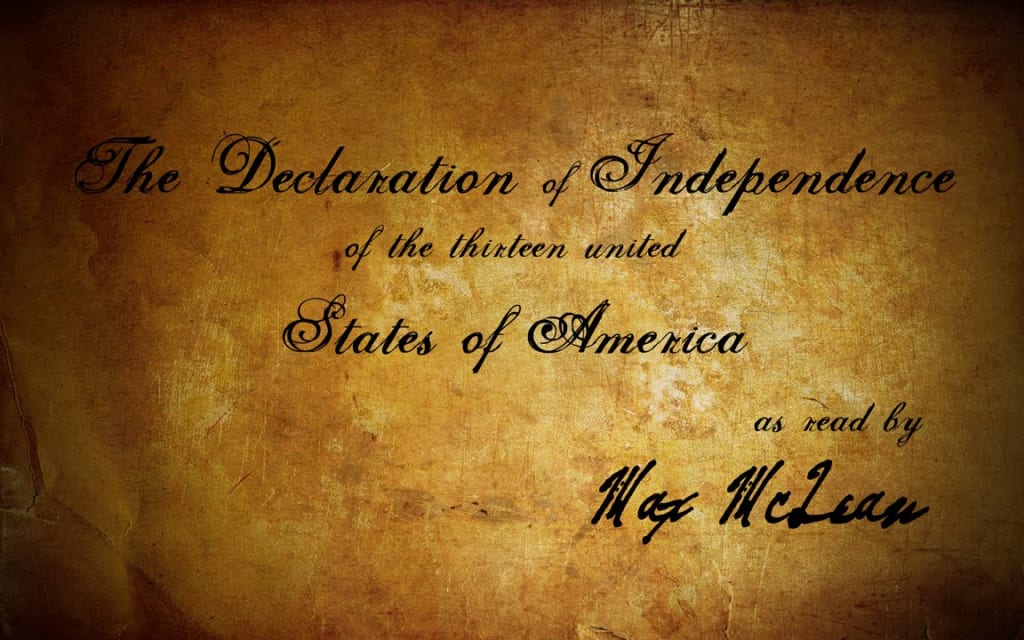Content warning
This story may contain sensitive material or discuss topics that some readers may find distressing. Reader discretion is advised. The views and opinions expressed in this story are those of the author and do not necessarily reflect the official policy or position of Vocal.
The Declaration of Independence: A Revolutionary Document that Shaped a Nation
A Revolutionary Document that Shaped a Nation

Introduction:
The Declaration of Independence stands as one of the most influential documents in the history of the United States. Adopted on July 4, 1776, this historic declaration marked a turning point in the American Revolutionary War and laid the foundation for the creation of a new nation. In this article, we delve into the significance, key principles, and lasting impact of the Declaration of Independence.
Part 1: Background and Context
The Declaration of Independence was the result of growing tensions between the American colonies and Great Britain. Years of grievances, including unjust taxation and lack of representation, led the colonists to seek independence and self-governance. The document emerged as a culmination of the desire for liberty and the recognition of natural rights.
Part 2: Key Principles
The Declaration of Independence eloquently articulated the fundamental principles that would shape the new nation. Its opening lines, with the famous words "We hold these truths to be self-evident," established the belief in inherent and unalienable rights, including life, liberty, and the pursuit of happiness. It proclaimed that governments derive their power from the consent of the governed, emphasizing the importance of the people's sovereignty.
Part 3: Grievances against King George III
The Declaration of Independence presented a detailed list of grievances against King George III, outlining the violations of the colonists' rights and the oppressive policies imposed by the British Crown. These grievances included unfair taxation, the quartering of troops, obstruction of justice, and the denial of basic civil liberties. The document served as a powerful indictment of tyranny and a call to action for independence.
Part 4: Significance of the Declaration
The Declaration of Independence had profound implications for both the American colonies and the wider world. It laid the groundwork for the establishment of a new nation based on the principles of self-governance, individual liberty, and the protection of natural rights. The document inspired other nations to pursue their own struggles for independence and played a crucial role in shaping democratic ideals around the globe.
Part 5: Legacy and Influence
The legacy of the Declaration of Independence is enduring. It became a touchstone for future generations, guiding the development of the United States' constitutional framework and serving as a beacon for freedom and equality. The principles embedded within the document, such as equality under the law, the right to a fair trial, and the freedom of speech, continue to shape the American identity and inform national discourse.
Part 6: Challenges and Unfinished Promises
While the Declaration of Independence represented a remarkable step towards freedom, it also highlighted the challenges and contradictions that would shape the nation's future. The issue of slavery, for example, remained unresolved at the time of its adoption, raising questions about the full realization of the document's principles. Over time, subsequent generations of Americans grappled with these challenges, striving to make progress towards a more perfect union.
Part 7: Commemoration and Celebration
Each year, the Fourth of July serves as a day of commemoration and celebration, marking the adoption of the Declaration of Independence. Across the United States, citizens come together to reflect on the values and principles enshrined in the document. Fireworks, parades, and patriotic displays are common during this time, signifying the enduring significance of the Declaration and the spirit of independence it represents.
Conclusion:
The Declaration of Independence stands as a testament to the courage, vision, and determination of the American colonists who sought to establish a free and independent nation. It articulated the principles that continue to shape the United States and inspire movements for liberty and justice worldwide. The Declaration's enduring legacy serves as a reminder of the transformative power of ideas and the ongoing
About the Creator
Enjoyed the story? Support the Creator.
Subscribe for free to receive all their stories in your feed. You could also pledge your support or give them a one-off tip, letting them know you appreciate their work.





Comments
There are no comments for this story
Be the first to respond and start the conversation.